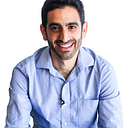17. Does the Internet unite or divide us? Does it expose us to different ideas from faraway lands, or does it allow us to filter them out and more easily find information that confirms our biases? Does it connect us with people completely different than us, or allow us to find people very similar to us and ignore the rest?
If you think the answer is clear in either direction, note the extremely conflicted research and opinions below.
What implications does this have if POLITICO were to enhance personalization of its products? Are there implications for the politics/policy community? Are there implications for our revenue? If the effect of the “filter bubble” is indeed negative, is POLITICO even in a position to do anything about it? If not, which stakeholder is, if any?
By Eli Pariser, co-founder of Upworthy
April 2012
…
When you enter a filter bubble, you’re letting the companies that construct it choose which options you’re aware of. You may think you’re the captain of your own destiny, but personalization can lead you down a road to a kind of informational determinism in which what you’ve clicked on in the past determines what you see next — a Web history you’re doomed to repeat. You can get stuck in a static, ever narrowing version of yourself — an endless you-loop.
…
The filter bubble tends to dramatically amplify confirmation bias — in a way, it’s designed to. Consuming information that conforms to our ideas of the world is easy and pleasurable; consuming information that challenges us to think in new ways or question our assumptions is frustrating and difficult. This is why partisans of one political stripe tend not to consume the media of another. As a result, an information environment built on click signals will favor content that supports our existing notions about the world over content that challenges them.
Related TED Talk: Beware online “filter bubbles” (Eli Pariser)
Political Polarization & Media Habits
Pew Research Center
October 21, 2014
…
In all three areas, the study finds that those with the most consistent ideological views on the left and right have information streams that are distinct from those of individuals with more mixed political views — and very distinct from each other.
These cleavages can be overstated. The study also suggests that in America today, it is virtually impossible to live in an ideological bubble. Most Americans rely on an array of outlets — with varying audience profiles — for political news. And many consistent conservatives and liberals hear dissenting political views in their everyday lives.
Related Readings:
Americans Don’t Live in Information Cocoons (NYT)
Where you get your news depends on where you stand on the issues (NiemanLab)
Will the Global Village Fracture into Tribes: Recommender Systems and Their Effects on Consumers
By University of Pennsylvania
April 2014
… We study whether personalization is in fact fragmenting the online population. Surprisingly, it does not appear to do so in our study. Personalization appears to be a tool that helps users widen their interests, which in turn creates commonality with others. This increase in commonality occurs for two reasons, which we term volume and product mix effects. The volume effect is that consumers simply consume more after personalized recommendations, increasing the chance of having more items in common. The product mix effect is that, conditional on volume, consumers buy a more similar mix of products after recommendations.
How Social Media Silences Debate
by The New York Times (Claire Cain Miller)
August 26, 2014
…
Social media, like Twitter and Facebook, has the effect of tamping down diversity of opinion and stifling debate about public affairs. It makes people less likely to voice opinions, particularly when they think their views differ from those of their friends, according to a report published Tuesday by researchers at Pew Research Center and Rutgers University.
…
The Internet, it seems, is contributing to the polarization of America, as people surround themselves with people who think like them and hesitate to say anything different. Internet companies magnify the effect, by tweaking their algorithms to show us more content from people who are similar to us.
How Facebook Is Changing the Way Its Users Consume Journalism
By The New York Times (Ravi Somaiya)
October 26, 2014
… Facebook now has a fifth of the world — about 1.3 billion people — logging on at least monthly. It drives up to 20 percent of traffic to news sites, according to figures from the analytics company SimpleReach.
The social media company is increasingly becoming to the news business what Amazon is to book publishing — a behemoth that provides access to hundreds of millions of consumers and wields enormous power. About 30 percent of adults in the United States get their news on Facebook, according to a study from the Pew Research Center.
…
The shift raises questions about the ability of computers to curate news, a role traditionally played by editors. It also has broader implications for the way people consume information, and thus how they see the world.
…
Facebook officials say that the more time users spend at its site, the more likely there will be a robust exchange of diverse viewpoints and ideas shared online. Others fear that users will create their own echo chambers, and filter out coverage they do not agree with.

